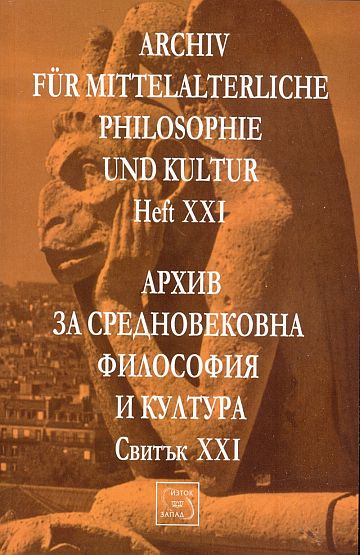The moral identity of the finite personal being as independent existence. The birth of the concept personalitas
The moral identity of the finite personal being as independent existence. The birth of the concept personalitas
Author(s): Gergana DinevaSubject(s): Metaphysics, Epistemology, Ethics / Practical Philosophy, Philosophy of Middle Ages, Systematic Theology
Published by: Издателство »Изток-Запад«
Keywords: identity; personalitas; person; persona; self; Duns Scotus; in¬communicability; existence
Summary/Abstract: The present text explores the philosophical context of the conceptual “birth” of the concept of personality as the primary knowledgeable marker of the unique human being as existential self, different from the common concept of “individual”. We trace the main definitions of the concepts person and later the one of personalitas, claiming that in the scholastic philosophy of 12th and 13th century one could witness a major development of the definition of persona, which results in the construction of the perosnalitas concept, inherited later by the early modern and modern philosophical thought as the main term denoting the uniqueness of the human being. For the most part this transformation is to be found in several of the works of the 13th century doctor subtilis John Duns Scotus, whose later influence on the university scholastics and the early modern thinking is considered to be essential by the vast majority of the scholars in history of medieval philosophy.The basis of this conceptual development lies in the new perspective, in which the definition of “person” is problematized. Scotus uses the tradition of the theological Trinitarian debate very well and introduces the persona concept into the field of anthropology, connecting it to the problem of infinite freedom of will of the finite human being and the possibility of a moral act at all. A fundamental role here plays the concept of incommunicability (incommunicabilitas), used by Scotus to define the intensity of the ontological freedom, which one finite rational being could possess, and to draw the boundaries allowing and defining the true moral action of each human being as its metaphysical power to realize its own unique existence. The conclusion we reach is that according to Scotus the personal identity is inextricably bound up with the moral action, as far as the human being is actualizing its nature as a single person by exercising its will, because its existence is a contingent and not necessary an independent one.
Journal: Архив за средновековна философия и култура
- Issue Year: 2015
- Issue No: 21
- Page Range: 207-231
- Page Count: 25
- Language: English, Latin
- Content File-PDF

